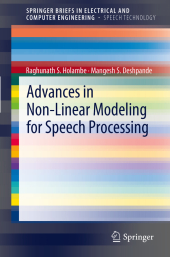 Neuerscheinungen 2012Stand: 2020-01-07 |
Schnellsuche
ISBN/Stichwort/Autor
|
Herderstraße 10
10625 Berlin
Tel.: 030 315 714 16
Fax 030 315 714 14
info@buchspektrum.de |

Mangesh S. Deshpande, Raghunath S. Holambe
(Beteiligte)
Advances in Non-Linear Modeling for Speech Processing
2012. 2012. xiii, 102 S. 32 SW-Abb., 9 Tabellen. 235 mm
Verlag/Jahr: SPRINGER, BERLIN 2012
ISBN: 1-461-41504-7 (1461415047)
Neue ISBN: 978-1-461-41504-6 (9781461415046)
Preis und Lieferzeit: Bitte klicken
Advances in Non-Linear Modeling for Speech Processing includes advanced topics in non-linear estimation and modeling techniques along with their applications to speaker recognition.
Non-linear aeroacoustic modeling approach is used to estimate the important fine-structure speech events, which are not revealed by the short time Fourier transform (STFT). This aeroacostic modeling approach provides the impetus for the high resolution Teager energy operator (TEO). This operator is characterized by a time resolution that can track rapid signal energy changes within a glottal cycle.
The cepstral features like linear prediction cepstral coefficients (LPCC) and mel frequency cepstral coefficients (MFCC) are computed from the magnitude spectrum of the speech frame and the phase spectra is neglected. To overcome the problem of neglecting the phase spectra, the speech production system can be represented as an amplitude modulation-frequency modulation (AM-FM) model. To demodulate the speech signal, to estimation the amplitude envelope and instantaneous frequency components, the energy separation algorithm (ESA) and the Hilbert transform demodulation (HTD) algorithm are discussed.
Different features derived using above non-linear modeling techniques are used to develop a speaker identification system. Finally, it is shown that, the fusion of speech production and speech perception mechanisms can lead to a robust feature set.
1. Introduction.- 2. Nonlinearity Framework in Speech Processing.- 3. Linear and Dynamic System Model.- 4. Nonlinear Measurement and Modeling using Teager Energy Operator.- 5. AM-FM Modulation and Demodulation Techniques.- 6. Application to Speaker Recognition.


